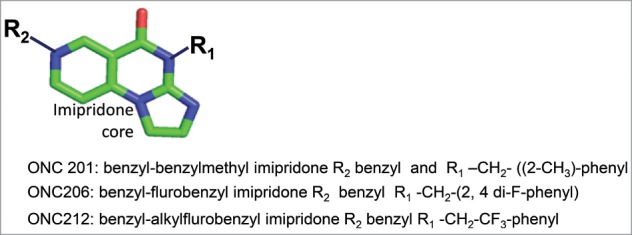Identification of candidate cancer therapeutic small molecule activators of the TRAIL gene was the primary goal that led to identification of TIC10 (later renamed as ONC201).1 Of >1000 molcules screened, ONC201 appeared to cause dual inhibition of p-ERK and p-AKT, nuclear translocation of Foxo3a and associated increase of TNF Related Apoptosis Inducing Ligand (TRAIL). In the original work, in vivo activity of TIC10/ONC201 was demonstrated in colorectal cancer, breast cancer, lung cancer, immunocompetent lymphoma, and GBM orthotopic models. Subsequent work in the El-Deiry Lab uncovered important insights into ONC201 activity including early induction of an integrated stress response involving eIF2-α, ATF4, CHOP and TRAIL death receptor DR5 activation.2 Similar observations were made in leukemia models.3 ONC201 has low toxicity against normal cells and appears safe in animals at doses that result in anti-cancer efficacy. Additional insights included work demonstrating activity of ONC201 against cancer stem cells.4
The first-in-human study of ONC201 was reported recently.5 In humans some initial efficacy has been observed in patients with uterine cancer and prostate cancer. Currently, a variety of clinical trials of ONC201 are ongoing including trials for GBM and gliomas (NCT02525692 and NCT0313431, respectively), solid tumors (NCT0225871), hematologic malignancies (NCT02863991, NCT02420795, and NCT023902572, respectively) and 2 soon-to-open trials including endometrial cancer (NCT03099499) and neuroendocrine tumors (e.g. desmoplastic small round cell tumor, primitive neuroectodermal tumors, neuroblastoma; NCT03034200).
Because cancer resistance to single agents is all too common, efforts were undertaken to develop analogs of ONC201 that may still have favorable PK characteristics, anti-cancer efficacy, low toxicity and potential to combine with other therapeutic agents. The paper by Jessica Wagner et al. in this volume6 details successful efforts to retain low toxicity against normal cells with increased potency of imipridone derivatives against various tumor cell lines. The authors describe favorable PK, induction or TRAIL/DR5 and nanomolar potency of 2 imipridone family members, ONC206 and ONC212. Of these ONC212 appears more potent against melanoma, prostate, breast cancer, and thyroid cell lines; ONC206 was more active against liver, lung, and kidney cancer cell lines. Further, Wagner et al. compared the kinetics of CHOP, TRAIL, and DR5 induction by ONC201, ONC206, and ONC212. Significant differences in time course and extent of induction of CHOP, TRAIL, and DR5 was seen. ONC212 was more rapid and best at 24 hours; ONC206 was similar to ONC201 at 24 hours, but superior to ONC201 and ONC212 at 48 and 72 hours. Further, temporal differences were revealed in cell cycle perturbations, which could lead to interesting opportunities to sequence these drugs with radiotherapy.
Proliferation, migration, and invasion are properties of resistant cancer cells that facilitate metastases. ONC201-resistant and TRAIL-resistant HCT116 Bax−/− cells had both migration and invasion inhibited by ONC201 and ONC206; however, ONC212 inhibited invasion only and had no effect on migration. Thus imipridone family members may have different effects on metastasis inhibition, an important quality of anticancer agents.
The authors demonstrated favorable efficacy of ONC212 versus ONC201 against in vivo models of liver cancer and melanoma. ONC212 was demonstrated to be orally bioavailable.
These investigations show successful efforts in building new and improved imipridone derivatives that may become useful for a wide variety cancers. As the imipridone family of anti-cancer agents expands, how best to use this unique class of low toxicity agents for active treatment and/or adjuvant therapy in combination with other agents and modalities in the clinic should become an even more exciting story (Fig. 1).
Figure 1.

The R1 aromatic side chain of imipridone derivatives ONC201, ONC206, and ONC212 provides new directions for nanomolar anti-cancer potency via TRAIL with unique characteristics.
Disclosure of potential conflicts of interest
No potential conflicts of interest were disclosed.
References
- [1].Allen JE, Kline CL, Prabhu VV, Wagner J, Ishizawa J, Madhukar N, Lev A, Baumeister M, Zhou L, Lulla A, , Stogniew M, Schalop L, Benes C, Kaufman HL, Pottorf RS, Nallaganchu BR, Olson GL, Al-Mulla F, Duvic M, Wu GS, Dicker DT, Talekar MK, Lim B, Elemento O, Oster W, Bertino J, Flaherty K, Wang ML, Borthakur G, Andreeff M, Stein M, El-Deiry WS. Discovery and clinical introduction of first-in-class imipridone ONC201. Oncotarget 2016; 7(45):74380-92; pmid: [DOI] [PMC free article] [PubMed] [Google Scholar]
- [2].Kline CL, Van den Heuvel AP, Allen JE, Prabhu VV, Dicker DT, El-Deiry WS. ONC201 kills solid tumor cells by triggering an integrated stress response dependent on ATF4 activation by specific eIF2alpha kinases. Sci Signal 2016; 9(415):ra18; pmid:; https://doi.org/ 10.1126/scisignal.aac4374 [DOI] [PMC free article] [PubMed] [Google Scholar]
- [3].Ishizawa J, Kojima K, Dilip A, Ruvolo VR, Carter BZ, Allen JE, Neelapu SS, McDonnell MJ, Talekar MK, El-Diery WS, Kwak LW, Andreeff M. ONC201 exerts p53-independent cytotoxicity through TRAIL and DR5 induction in mantle cell lymphomas. Blood 2013; 122(21):3822. [Google Scholar]
- [4].Prabhu VV, Allen JE, Dicker DT, El-Deiry WS. Small-Molecule ONC201/TIC10 Targets Chemotherapy-Resistant Colorectal Cancer Stem-like Cells in an Akt/Foxo3a/TRAIL-Dependent Manner. Cancer Res 2015; 75(7):1423-32; pmid:; https://doi.org/ 10.1158/0008-5472.CAN-13-3451 [DOI] [PMC free article] [PubMed] [Google Scholar]
- [5].Stein MN, Bertino JR, Kaufman HL, Mayer T, Moss R, Silk A, Chan N, Malhotra J, Rodriguez L, Aisner J, , Aiken RD, Haffty BG, DiPaola RS, Saunders T, Zloza A, Damare S, Beckett Y, Yu B, Najmi S, Gabel C, Dickerson S, Zheng L, El-Deiry WS, Allen JE, Stogniew M, Oster W, Mehner JM. First-in-human clinical trial of oral ONC201 in patients with refractory solid tumors. Clin Cancer Res 2017. pmid:; https://doi.org/ 10.1158/1078-0432.CCR-16-2658 [DOI] [PMC free article] [PubMed] [Google Scholar]
- [6].Wagner J, Kline CE, Ralff MD, Lev A, Lulla A, Zhou L, Olson GL, Nallaganchu BR, Benes CH, Allen JE,. Prabu VV, Stoignew M, Oster W, El-Deir WS. Preclinical evaluation of the imipridone family, analogues of clinical stage anti- cancer small molecule ONC201, reveals potent anti-cancer effects of ONC212. Cell Cycle 2017; pmid:; https://doi.org/ 10.1080/15384101.2017.1325046 [DOI] [PMC free article] [PubMed] [Google Scholar]


